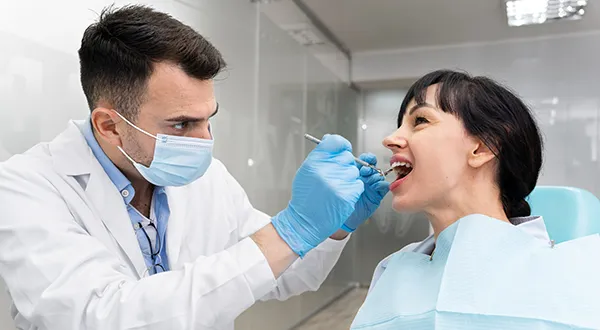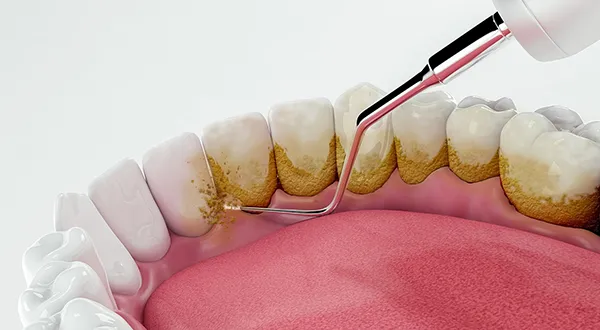What to Do If You Have Periodontal (Gum) Disease?
2023-12-18
We all strive for a perfect smile and healthy gums. But sometimes, our gums become tender or bleed because of plaque accumulation. When gum problems aren't treated well on time, it may cause a severe form of the disease, i.e., periodontal disease.
This oral health illness affects the tissues surrounding and supporting your teeth and may cause tooth loss. However, the good news is periodontal disease is still treatable, provided you make the necessary efforts to reduce its repercussions.
This article will discuss everything about periodontal disease to clarify things, such as symptoms, causes, and treatment options. Moreover, you'll also get to know some ways that help you manage, treat, and prevent this condition to preserve your oral health. So, let's get started.
Quick Overview of Periodontal Disease
Periodontal disease is a widespread condition that impacts millions of individuals worldwide. The plaque or tartar buildup on the teeth and gums is chiefly responsible for causing this disease. This accumulation further leads to inflammation and damage to the supportive soft tissue and bone surrounding the teeth, deteriorating oral health.
If left untreated, periodontal disease may cause various oral health problems, such as receding gums, tooth loss, and even bone loss. Therefore, it is vital to seek prompt treatment to prevent further complications and maintain optimal oral health. Here are some reasons why treating periodontal disease is crucial:
- Prevent tooth loss:
Periodontal disease is the leading cause of tooth loss in adults. As the condition progresses, the teeth become loose and may eventually fall out. Treating periodontal disease can help prevent tooth loss and preserve your natural teeth.
- Improve overall oral health:
Periodontal disease can lead to other oral health problems, such as bad breath, receding gums, and tooth sensitivity. Treating the condition can improve your overall oral health and prevent further complications.
- Reduce the risk of other health problems:
Studies have linked periodontal disease to other health issues, such as heart disease, stroke, and diabetes. Treating periodontal disease helps reduce the risk of developing these serious health problems.
- Save money:
Treating periodontal disease can be costly, but it's much more affordable than tooth replacement or other more extensive dental procedures that may be necessary if the condition is left untreated.
"The World Health Organization states that severe periodontal disease affects 10-15% of adults worldwide and significantly contributes to tooth loss in adults".
Signs and Symptoms of Periodontal Disease
- Red, swollen, or bleeding gums:
Healthy gums should be pink and firm, but you may have periodontal disease if you notice your gums are red, swollen, or bleed while you brush or floss.
- Bad breath:
Persistent bad breath that doesn't go away even after brushing or using mouthwash can signify periodontal disease.
- Receding gums:
As periodontal disease progresses, your gums start to shrink. It further exposes the roots of your teeth and causes sensitivity.
- Loose or shifting teeth:
The loss of the bone supporting the teeth due to periodontal disease may cause the teeth to become loose or change their position.
- Pain or discomfort:
You may experience pain or discomfort when you bite or chew if you have periodontal disease. The damaged tissues and bone around your teeth can make them more sensitive.
- Pus around your teeth:
Sometimes, periodontal disease can cause pus to develop around your teeth and gums.
If you suspect any of these signs and symptoms, you must visit your dentist as soon as possible for an evaluation. Early detection and treatment of periodontal disease can help stop the progression of the disease. Moreover, you can preserve your oral health by taking the right action on time.
Leading Causes of Periodontal Disease
- Plaque buildup:
The primary cause of periodontal disease is the accumulation of plaque, a sticky film composed of bacteria, on the teeth and gums.
- Poor oral hygiene:
If you don't brush and floss regularly, plaque can build up and harden into tartar, irritating and inflaming the gums.
- Smoking:
Smoking weakens the immune system and can cause gum tissue to break down.
Genetics:
Some people are more prone to periodontal disease due to their genetic makeup. So, genes also play a role in developing the disorder. If periodontal disease runs in your family, it's best to seek a dentist's advice in advance.
- Hormonal changes:
Women may be more prone to gum disease due to hormonal changes during pregnancy, menstruation, and menopause.
- Certain medical conditions:
Diabetes, heart disease, and other conditions can increase the risk of periodontal disease.
- Medications:
Some medications, such as antidepressants and oral contraceptives, can cause dry mouth, contributing to gum disease.
What To Do If You Have Periodontal Disease?
If you have periodontal disease, there are several steps you can take to manage the condition and prevent further damage. Here's is the list of things that you should do at your earliest:
- Schedule a dental appointment:

The first step in treating periodontal disease is to see your dentist. Visit your nearest dentist for an evaluation of your teeth and gums. Your dentist will look for signs of plaque and tartar buildup. You can expect a series of dental X-rays that your dentist may recommend. Your dentist will also measure the extent of pockets between your teeth and gums to create a treatment plan to treat the issue.
- Practice good oral hygiene:
Follow a healthy routine, and don't forget to master the art of brushing and flossing. Brush your teeth at least twice regularly after every meal. Also, use dental floss daily to cleanse your teeth. Moreover, it is best to use an antiseptic mouthwash to remove bacteria and plaque from your teeth and gums. Consult your dentist to find the right mouthwash to preserve your oral health.
- Quit smoking:
Smoking can worsen periodontal disease and reduce treatment effectiveness. People who smoke have receding gums that do not heal properly even after the necessary treatment. If you quit smoking, you can encourage healthy transformation in your mind, body, and well-being.
- Eat a balanced diet:
Use whole grains, fruits, and vegetables in your everyday diet. Always eat a well-balanced and nutritious diet and avoid sugary and acidic foods. It will help improve your oral health and reduce inflammation in your gums.
- Get regular dental cleanings:
Visiting a dentist regularly for dental cleanings helps remove plaque and tartar buildup. It also prevents the progression of periodontal disease and keeps your teeth and gums healthy. Schedule a dental appointment at least every 6 months for the best results.
- Consider treatment options:
Follow your dentist's advice and consider treatment options for periodontal disease. Depending on the severity of the condition, your dentist may recommend treatment options such as scaling and root planing, antibiotics, or surgery.
Taking prompt action is essential if you suspect you have periodontal disease. By following these steps, you can manage the condition and prevent further damage to your teeth and gums. Remember, early detection and treatment are vital in preserving your oral health.
Wrap Up
Periodontal disease is a prevalent condition that may result in tooth loss and other related health issues. However, it's possible to prevent and manage periodontal disease by adopting proper oral hygiene practices and regularly scheduled dental check-ups.
Treatment for periodontal disease may involve professional cleanings, scaling and root planing, antibiotics, or surgery, depending on the severity of the condition. It's crucial to adhere to the recommendations provided by your dentist and maintain good oral hygiene habits to prevent the recurrence of the disease.
Preventing and treating periodontal disease can safeguard oral health and lower your risk of other related health problems. You can maintain a healthy and beautiful smile for years with proper treatment.
Contact your dentist in Walnut Creek, Dr. Darvishzadeh at Walnut Creek Dental, to learn more about what to do if you have Periodontal (Gum) Disease.
Resource:
Dental Exams and Cleaning Procedures
*This media/content or any other on this website does not prescribe, recommend, or prevent any treatment or procedure. Therefore, we highly recommend that you get the advice of a qualified dentist or other medical practitioners regarding your specific dental condition*
Subscribe To Our Newsletter
Get Updates And Learn From The Best
